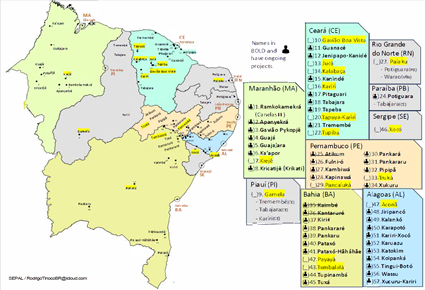Kiriri is a Tupi word that means "quiet people" or "silent people." The coastal Tupi gave this name to the indigenous groups who lived in the countryside.
Basic farming is the main part of their daily life. They grow cassava, corn, and beans. Most of what they produce is for their own use, but any extra is sold in local markets or fairs.
They also collect wild fruits such as cashew, umbu, and sugar apple, and they make crafts like pottery and woven baskets, although some of these traditions have weakened over time.
Because of harsh weather conditions (such as drought) and outside pressures, many Kiriri also depend on seasonal or temporary work to earn money, leaving their land for certain periods of the year.
The Kiriri believe that everything in the world—animals, plants, rivers, and the land—has life and spiritual power.
Their main religious leader is known as the Toré, a central figure in community rituals. Over time, Catholic influences have mixed with their ancestral spirituality because of contact with missionaries. Today, the Kiriri practice a form of syncretism, combining Christian symbols (such as crosses, saints, and prayers) with their traditional songs, dances, and Toré rituals.
They desperately need to understand who God truly is, without religion standing in the way and blinding them.
Pray for God to break the idols, barriers, and false beliefs that they now see as truth.
Pray for softened hearts so they can truly understand and personally know who Christ really is.
Ask God to use nature on his behalf to show them how to love the Creator instead of the created things.
Pray that soon the Kokamas will be Christ's ambassadors to other tribes.
Scripture Prayers for the Kiriri in Brazil.
https://pib.socioambiental.org/pt/Povo:Kiriri
https://osprimeirosbrasileiros.mn.ufrj.br/pt/mundo-contemporaneo/kiriri/
| Profile Source: Joshua Project |











